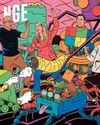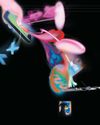
HERE'S A QUICK typology of tech journalism today: news reporting ("Amazon Announces Layoffs Affecting 18,000 Employees"), gadget reviews, company and founder profiles, opinion essays (Zeynep Tufekci et al.), investigative work ("The Uber Files"), industry digests (TechCrunch), personal blogs, Substacks, and if you're feeling generous-Hacker News comments and GitHub "issues." It's an incomplete catalog, but you get the idea. Yet surveying this landscape reveals a curious lacuna: software criticism.
To be clear: Technology criticism is nothing new. Depending on who you ask, it goes way back to Lewis Mumford, Herbert Marcuse, Martin Heidegger, and Marshall McLuhan. More recently, I assume you've at least heard of popular books like The Age of Surveillance Capitalism and The Attention Merchants and may even be familiar with technology critics like Jaron Lanier, Evgeny Morozov, and Ellen Ullman. Or Fred Turner, Gabriella Coleman, and Sherry Turkle, to name a few from the academic flank.
But software criticism is not the same as technology criticism. A work of software criticism is to Nicholas Carr's "Is Google Making Us Stupid?" what a New York Times book review is to Virginia Woolf's "Modern Fiction." The latter is a more synoptic assessment of the field, while the former is a focused interrogation of a single work.
So where are software critics? Like the rise of novels in the 18th and 19th centuries or jazz in the 1920s, isn't software a defining artifact of our time? How in Turing's name hasn't a culture of software criticism emerged?
This story is from the July - August 2023 edition of WIRED.
Start your 7-day Magzter GOLD free trial to access thousands of curated premium stories, and 9,000+ magazines and newspapers.
Already a subscriber ? Sign In
This story is from the July - August 2023 edition of WIRED.
Start your 7-day Magzter GOLD free trial to access thousands of curated premium stories, and 9,000+ magazines and newspapers.
Already a subscriber? Sign In

MOVE SLOWLY AND BUILD THINGS
EVERYTHING DEPENDS ON MICROCHIPS-WHICH MEANS TOO MUCH DEPENDS ON TAIWAN. TO REBUILD CHIP MANUFACTURING AT HOME, THE U.S. IS BETTING BIG ON AN AGING TECH GIANT. BUT AS MONEY AND COLOSSAL INFRASTRUCTURE FLOW INTO OHIO, DOES TOO MUCH DEPEND ON INTEL?

FOLLOW THAT CAR
CHASING A ROBOTAXI FOR HOURS AND HOURS IS WEIRD AND REVELATORY, AND BORING, AND JEALOUSY-INDUCING. BUT THE DRIVERLESS WORLD IS COMING FOR ALL OF US. SO GET IN AND BUCKLE UP.

REVENGE OF THE SOFTIES
FOR YEARS, PEOPLE COUNTED MICROSOFT OUT. THEN SATYA NADELLA TOOK CONTROL. AS THE COMPANY TURNS 50, IT'S MORE RELEVANT-AND SCARIER-THAN EVER.

THE NEW COLD WARRIOR
CHINA IS RACING TO UNSEAT THE UNITED STATES AS THE WORLD'S TECHNOLOGICAL SUPERPOWER

CALIFORNIA DREAMIN'
KINDRED MOTORWORKS VW BUS - Despite being German, the VW T1 Microbus is as Californian as the Grateful Dead.

THE INSIDE SCOOP ON DESSERT TECH
A lab in Denmark works to make the perfect ice cream. Bring on the fava beans?

CONFESSIONS OF A HINGE POWER DATER
BY HIS OWN estimation, JB averages about three dates a week. \"It's gonna sound wild,\" he confesses, \"but I've probably been on close to 200 dates in the last year and a half.\"

THE WATCHFUL INTELLIGENCE OF TIM COOK
APPLE INTELLIGENCE IS NOT A PLAY ON \"AI,\" THE CEO INSISTS. BUT IT IS HIS PLAY FOR RELEVANCE IN ALL AREAS, FROM EMAIL AUTO-COMPLETES TO APPS THAT SAVE LIVES.

COPYCATS (AND DOGS)
Nine years ago, a pair of freshly weaned British longhair kittens boarded a private plane in Virginia and flew to their new home in Europe.

STAR POWER
The spirit of Silicon Valley lives onat this nuclear fusion facility's insane, top-secret opening ceremony.